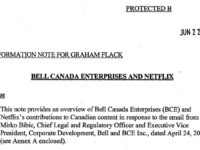The Carney government’s steady reset of Canadian digital policy continues as it has now backed off plans to ban TikTok from operating in Canada. The government’s approach, first announced in November 2024, never made any sense since the TikTok app remained available without restriction and the corporate ban weakened privacy enforcement and resulted in millions in lost cultural support. The policy was a true lose-lose-lose and seemed premised on piggybacking on U.S. legislation to ban the app. The change in U.S. administration effectively nixed those plans, leaving Canadians with the worst of both worlds: a corporate ban that created real harms with no discernible benefit and a Canadian TikTok app that would ultimately offer fewer safeguards than the U.S. equivalent.
The reset on the TikTok ban came through what amounts to a settlement between the government and TikTok that was made official yesterday by the federal court.











